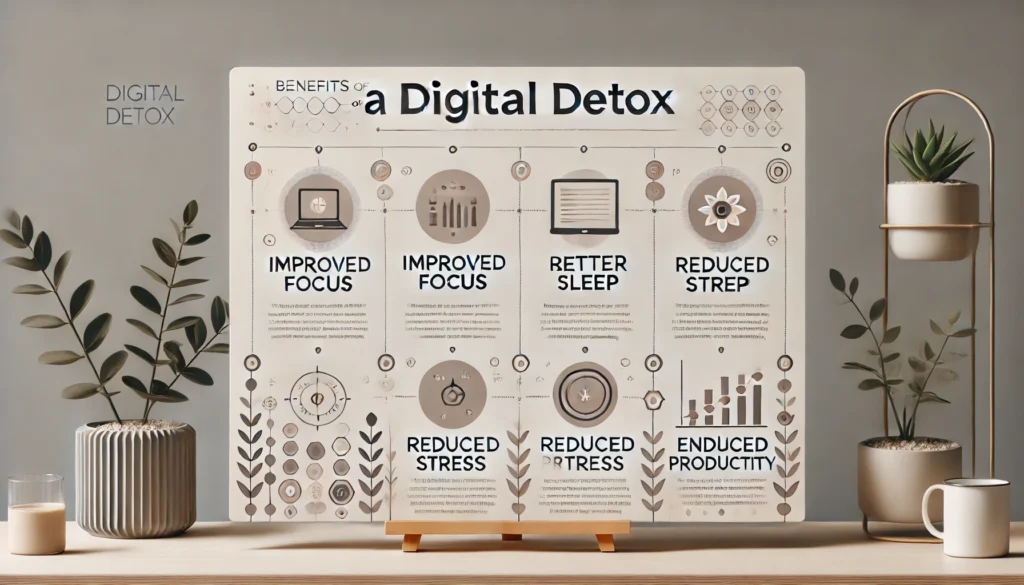Screens dominate modern life. From smartphones to laptops, digital devices shape daily routines. However, excessive screen time can negatively impact mental and physical health. Therefore, a digital detox helps restore balance and improve focus. This article explores effective strategies to reduce screen dependency and enhance concentration.

Understanding the Effects of Excessive Screen Time
The Science Behind Digital Overload
Prolonged screen exposure significantly affects brain function. The constant influx of notifications, social media updates, and emails overwhelms cognitive processing. In fact, studies show that excessive digital engagement reduces attention span and increases mental fatigue. Moreover, blue light exposure from screens disrupts sleep patterns, further impacting cognitive performance.
Psychological Impacts of Screen Addiction
Compulsive screen use contributes to anxiety and depression. The dopamine-driven reward system in digital interactions fosters addiction-like behavior. Additionally, social media comparisons also lower self-esteem, leading to emotional distress. Therefore, reducing screen time supports better mental well-being.
Physical Consequences of Screen Overuse
Excessive screen time often causes eye strain, headaches, and poor posture. Furthermore, prolonged sitting can lead to musculoskeletal issues and decreased physical activity. Additionally, disrupted circadian rhythms due to late-night screen exposure negatively affect overall health.
Effective Strategies for a Successful Digital Detox
Setting Clear Boundaries with Screen Time
Defining screen-free zones in daily routines fosters healthier habits. For instance, avoiding screens during meals enhances social interactions. Likewise, establishing tech-free hours before bedtime significantly improves sleep quality.
Practicing Mindful Technology Use
Conscious engagement with digital devices helps reduce unnecessary screen time. Turning off non-essential notifications minimizes distractions. Furthermore, using grayscale mode on smartphones makes screens less appealing, reducing compulsive scrolling.
Incorporating Alternative Activities
Replacing screen time with enriching activities significantly improves focus. Reading books, engaging in outdoor exercise, or practicing mindfulness enhances cognitive function. Similarly, creative hobbies like painting or playing musical instruments stimulate brain activity without digital interference.
How Digital Detox Enhances Focus and Productivity
Rewiring the Brain for Better Concentration
Reducing digital distractions strengthens neural pathways responsible for deep focus. When screens dominate attention, multitasking becomes a habit, impairing cognitive efficiency. However, limiting screen exposure helps train the brain to sustain attention for longer periods.
The Role of Sleep in Cognitive Performance
Quality sleep plays a crucial role in maintaining focus. Exposure to blue light before bedtime suppresses melatonin production, delaying sleep onset. Therefore, implementing a digital curfew at least an hour before bed improves sleep hygiene and boosts cognitive function.
Enhancing Work Efficiency with Focused Practices
A structured approach to work significantly minimizes digital disruptions. Techniques like the Pomodoro method encourage focused work sessions with scheduled breaks. Additionally, using website blockers prevents unnecessary browsing, promoting deep work.
Digital Detox Techniques for Different Age Groups
Digital Detox for Children and Teens
Young minds are highly susceptible to digital addiction. Encouraging outdoor activities and limiting social media use fosters healthier habits. Moreover, parental controls and app restrictions help regulate screen exposure. Additionally, setting a positive example reinforces mindful technology use.
Digital Detox for Adults and Professionals
Balancing digital engagement with offline activities enhances mental well-being. Taking regular screen breaks reduces mental exhaustion. Furthermore, prioritizing in-person interactions over virtual communication strengthens social bonds.
Digital Detox for Seniors
Older adults benefit from reduced screen time through improved cognitive health. Engaging in physical activities, reading, or gardening provides mental stimulation. Moreover, fostering real-world connections combats digital isolation.

Overcoming Common Challenges in Digital Detox
Managing Withdrawal Symptoms
Sudden reduction in screen time may cause irritability or restlessness. Therefore, gradually decreasing digital exposure prevents withdrawal effects. Moreover, engaging in fulfilling offline activities eases the transition.
Staying Motivated for Long-Term Change
Setting personal goals reinforces commitment to digital detox. Additionally, tracking progress through journals or apps enhances accountability. Moreover, celebrating milestones fosters a positive mindset toward reduced screen dependency.
Cultivating a Balanced Digital Lifestyle
A sustainable digital detox involves mindful technology use rather than complete avoidance. Therefore, adopting a balanced approach ensures long-term benefits. Establishing digital mindfulness practices helps maintain a healthy relationship with screens.
Conclusion
Reducing screen time improves focus, mental clarity, and overall well-being. A structured digital detox plan significantly enhances productivity and strengthens real-world connections. By setting clear boundaries, engaging in alternative activities, and adopting mindful technology use, individuals regain control over their digital habits. Ultimately, a balanced approach to technology fosters a healthier and more focused life.
